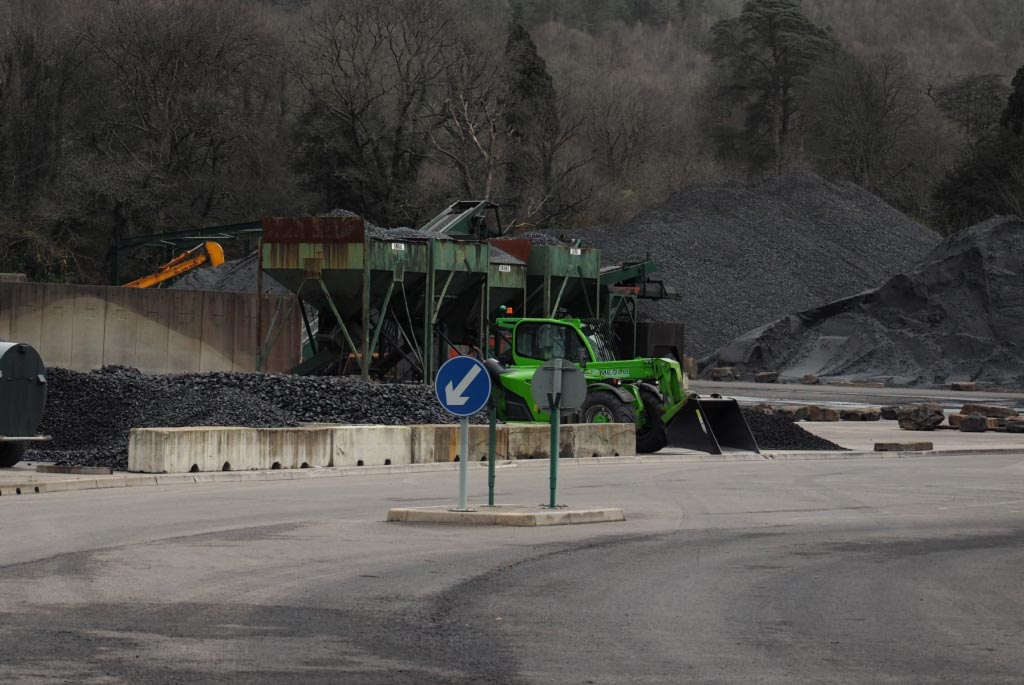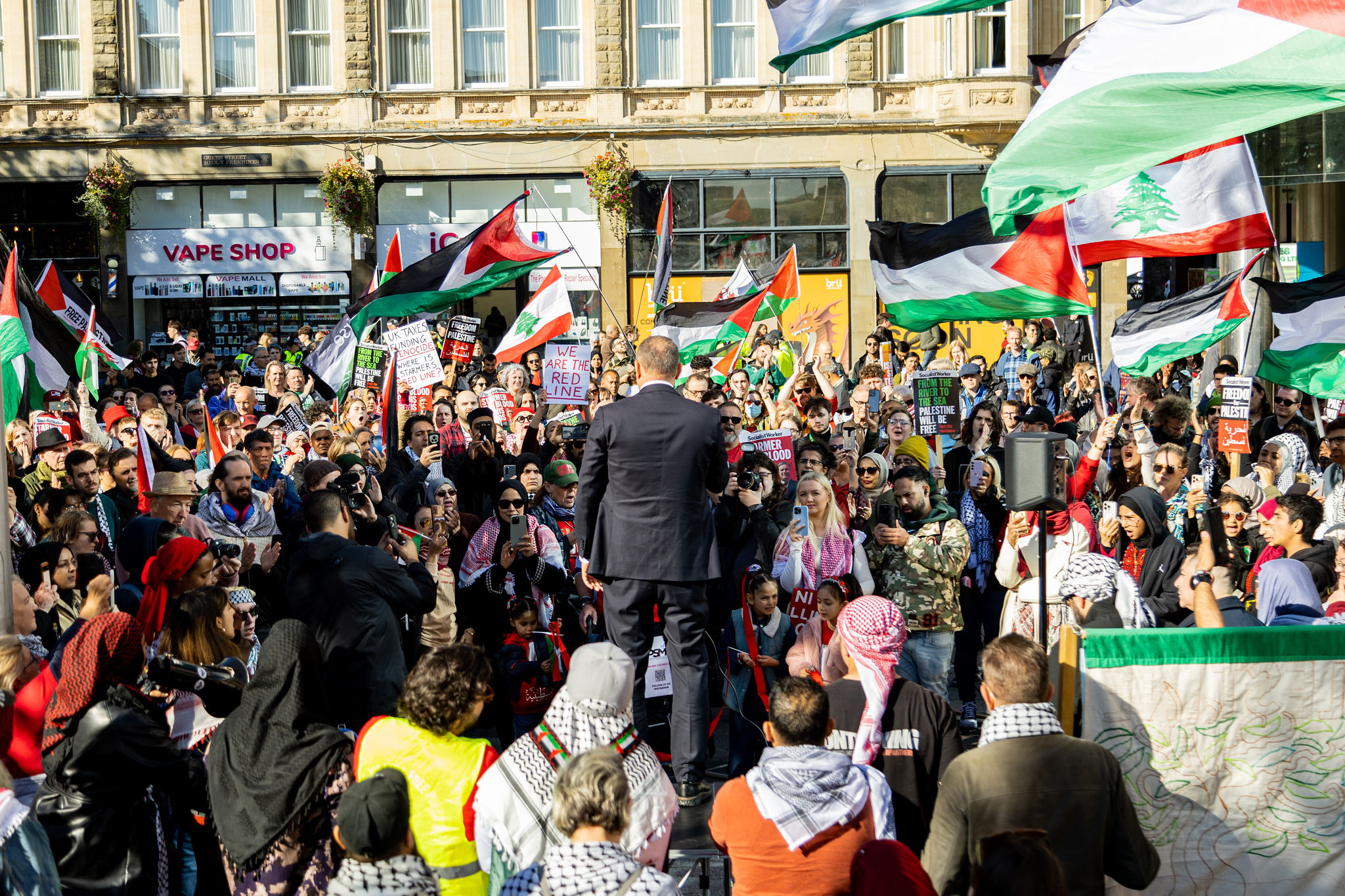
Does Voter Revolt Over Gaza Spell The End For Labour?
British Muslims abandoned Keir Starmer’s Labour party in droves at the last election. But could the pro-Palestine movement change our politics for good?
By SC Cook. Cover image, the Palestinian Ambassador to the UK, Husam Zomlot, addresses a protest in Cardiff, 12th October 2024, by Rhydian Witts
It was Wednesday, July 3rd 2024 in the Zeitoun neighbourhood of Gaza city. A market vendor lay dead on the floor, his blood soaking into the bread he had been selling just moments earlier. He was one of seventeen Palestinians murdered in broad daylight at the market that day, after an Israeli drone fired into the crowd. The others, whose identities have never been reported, were children, women and unarmed civilians who had been huddling around some water butts. Had it not been for an Al Jazeera journalist on the ground, those of us on the outside may never have even known about it. But this was a massacre.
When polling stations opened for the UK general election a day later, the horror witnessed in Zeitoun was not part of the mainstream narrative. But even limited democracy still has the power to upheave.
As Jonathan Ashworth took to the stage of the Leicester South election count in the early hours of July 5th, he would already have been aware that things weren’t exactly going to plan. Despite the sweeping majority Labour were on course to win, the party was shedding votes to a broad spectrum of pro-Palestinian candidates.
His leader, Keir Starmer, had just seen his vote share fall by 15 per cent, losing over 17,500 votes compared to 2019. Standing against Starmer on a pro-Gaza platform was Andrew Feinstein, an anti-apartheid veteran and son of a Holocaust survivor, who jumped into second place with over 7,000 votes. By the end of the night, Labour had lost five seats to independent candidates who had made opposition to Israel’s genocide a central pillar of their campaign. Jonathan Ashworth was the biggest casualty, his majority of 22,675 shattered by the independent Shockat Adam.
In short, the war crimes committed by Israel with the support of the US and Britain had come back to haunt the party whose message to Benjamin Netanyahu after October 7th was clear: do whatever you like, you have our full backing.
In the subsequent eighteen months and more, Israel killed at least 50,000 people in Gaza, including 17,492 children. A further 113,274 people, many of them children, have been injured and more than 14,222 are missing and presumed dead. The true death toll has been estimated as high as 186,000. After just one year, 902 Palestinian families had been completely wiped out and one out of every 100 children in Gaza had been killed by Israel.
There’s a reason that the charge of genocide has stuck.
Outrage at Labour’s slavishly pro-Israel position goes far beyond what is lazily termed the ‘Muslim community.’ But Muslim voters who had previously been loyal to the party are nevertheless key to understanding how solidarity with Palestinians forced its way into the UK election and may help change politics beyond it. What the party might have assumed would only be a crack in support from a once reliable voter base quickly turned into a chasm.
You could see the fissure happening on the streets, and never more so than in London on 11th November 2023.
It was the most powerful display of pro Palestinian sentiment Britain had ever seen. Undeterred by the howls of outrage from the Home Secretary, the Metropolitan Police and the familiar sewage runs of the British media, who had tried and failed to use remembrance as a pretext to ban the protest, both the Stop the War Coalition and Palestine Solidarity Campaign had pressed ahead with the plan to march.
In the end, up to a million people from all different backgrounds turned out and took over the streets. The police just watched.
Parallels with the huge anti-Iraq war mobilisation some twenty years earlier were impossible to ignore. And in a society where Islamophobia has become pervasive, it was striking to witness rows of Muslim worshippers lining the central walkway along Park Lane.
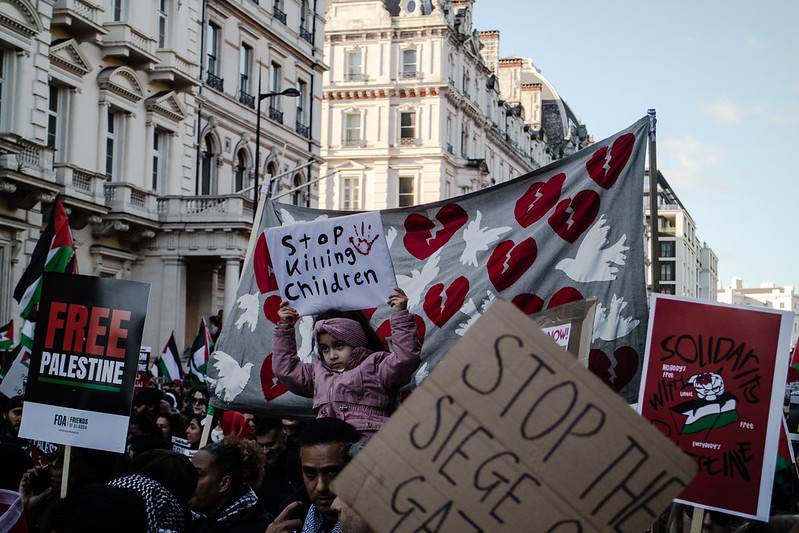
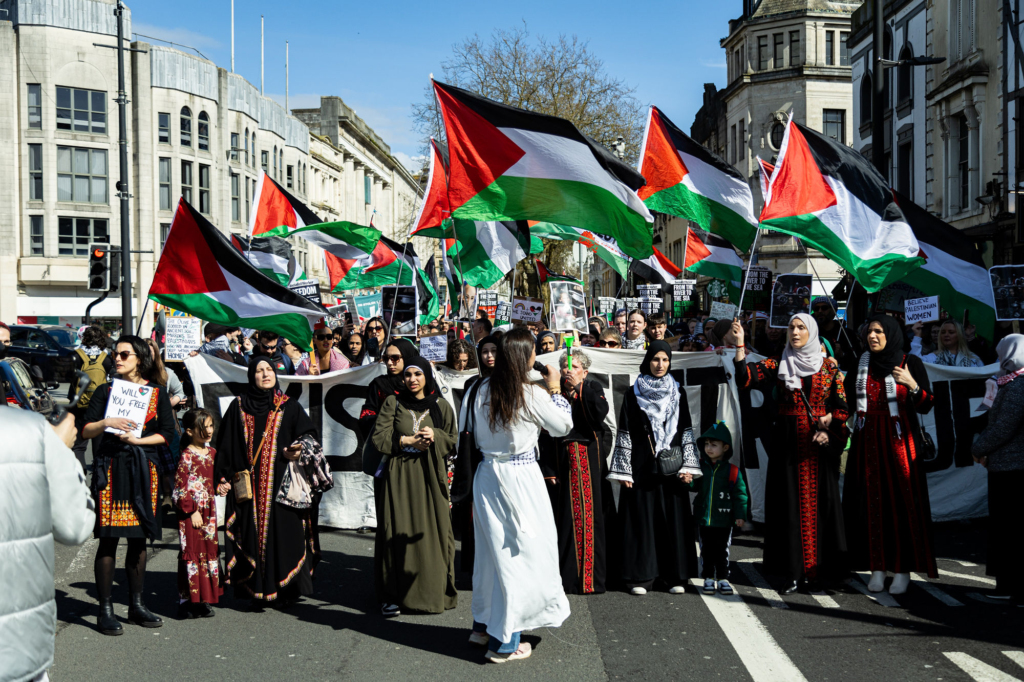
Amidst the throbbing crowd, I ran into a group of Muslim cyclists from Essex. A man called Shams, a professional medic, explained how over a ten-year period the group had steadily raised money for Gaza – to fund new school buses, solar panels to power hospitals and water sanitation sites.
But everything they’d been able to provide was now rapidly being blown apart and he was watching the sheer horror of the Israeli offensive beamed across Al Jazeera and social media feeds.
“You know what, I’m actually going through a mental breakdown,” Shams said with absolute seriousness. “My wife can’t sleep at night, seeing what we see.” Motivated to do anything they could to force a ceasefire, the group had cycled to London every weekend to protest. But there was another phenomenon happening at the same time. “I mean, my family comes from a very long line of Labour supporters. This is what we’ve been aligned with,” he said.
“But to be honest with you, from the next election I’m absolutely against Labour now. There is no difference between Labour and the Conservative party.”
But Shams wasn’t planning on simply staying at home on election day. “In fact, we’re going to be actively making sure that Labour doesn’t win any sort of votes, any seats in our area,” he told me amidst the din of the protest.
For Shams and many others, the major tipping point came in the immediate aftermath of October 7th with Keir Starmer’s now infamous appearance on LBC Radio. In response to a direct question about whether Israel should cut off Gaza’s water and food supply, the Labour leader responded in the affirmative, saying that “Israel does have that right.”
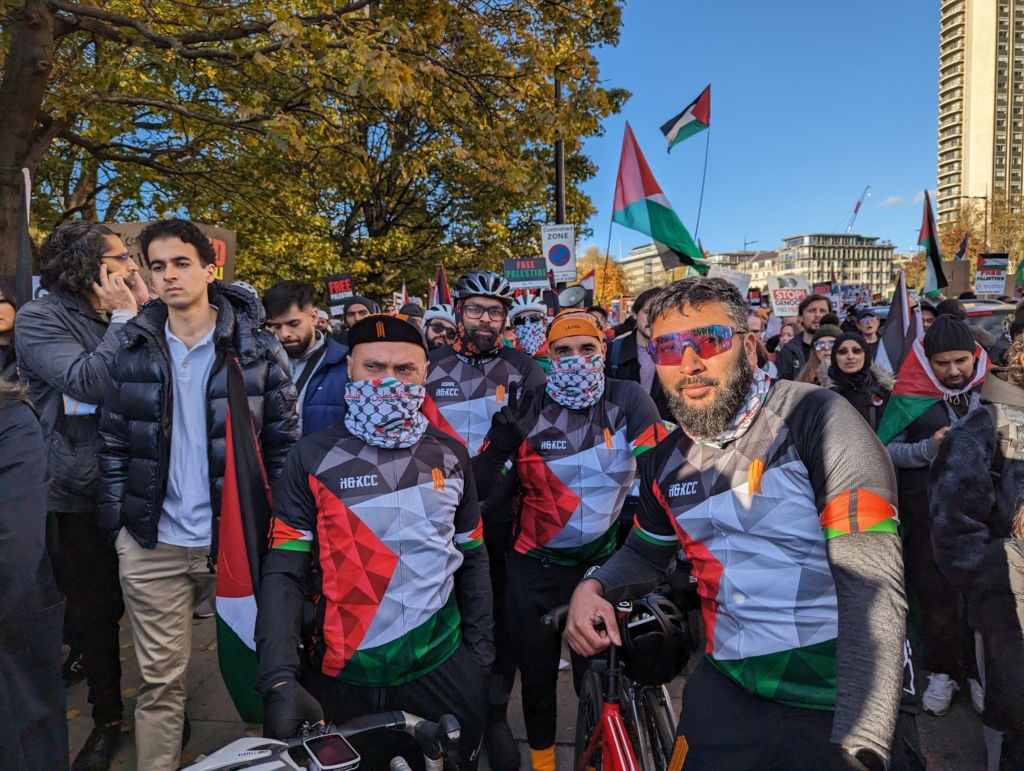
“That caused a lot of hurt in the community,” says Taj Ali, a journalist and former editor of Tribune Magazine. “In the age of social media that clip was going round, on WhatsApp group chats, Twitter, Tik Tok.”
Then in November 2023, the SNP tabled an opposition day motion calling for a ceasefire in Gaza. “Labour’s position was to abstain and there was a massive backlash,” says Taj Ali. “They assumed that would go away at the General Election, but it didn’t.”
Sumayya, a Muslim woman from Cardiff who had thrown herself into the movement, recalls how “there was a huge demand for a ceasefire. And we realised that no matter how many emails we sent, no matter how many phone calls we made to our MPs, we were not getting representation.”
She and others quickly decided on an idea of bringing together various organisations into the Muslim Vote campaign, to engage voters around what was happening in Palestine and ensuring that Muslim voters were never taken for granted again.
“It’s a very sad thing that that was what it had to be, that a genocide triggered this movement,” she says. “But it is something that had been brewing for a long time…what we needed to do was organise and provide alternatives and show our strengths.” Sumayya soon became a national coordinator for the Muslim Vote campaign and threw herself into activity.
Meanwhile, the street movement against the Israeli onslaught was exploding. Towns, cities and even villages witnessed an eruption of protest over the issue, many urging their elected politicians to act. In my own city of Cardiff, activists have been relentless in their organising efforts, organising weekly demonstrations, occupations and direct actions that have often numbered well into the thousands. The constituency offices of Labour MPs became a target of protests, with many local people complaining that they had not been able to engage with their MP at all over the issue.
But despite attempts to ignore or discredit the movement, often smearing protesters as violent, cracks were emerging within Labour. Large groups of Labour councillors resigned over Gaza and the party lost control of councils in Oxford, Burnley, Norwich and Hastings. Over 250 Muslim Labour councillors signed an open letter in protest at Keir Starmer’s position.
It wasn’t long before the consequences started to show. “You start to see Labour losing support,” says Ali. “In the local elections, they were struggling in a number of places like Blackburn and Dewsbury.”
Not only were once loyal voters abandoning the party, but key activists were too. “You had party members who were crucial in getting the vote out in these constituencies, who had the networks and who were connected to the communities and the mosques,” he explains. “When they left the party, they took others with them.”
This even included Ali’s own father, who had voted Labour his entire life. “My dad who doesn’t really follow politics much but was clued into something like Al Jazeera and was thinking, ‘oh maybe the Greens have a better line on Gaza.’”
And it wasn’t just his dad, Ali says that he never could have imagined so many people of Pakistani and Bangladeshi heritage voting for the Greens but admits that the party “did cut through.” Sumayya was witnessing a similar phenomenon in Cardiff. “There were a lot of people that were saying, you know, I’m not going to vote for Labour again,” she recalls. “People had started revoking their memberships, counsellors resigning and just messages going around WhatsApp calling for blocking out any more Labour support.”
“And it didn’t start slowly,” she adds. “It started very robustly.” Sumayya had joined Labour under Jeremy Corbyn’s leadership because she felt he had “a genuine interest in investing in the welfare of people.” But now she found herself actively encouraging people to vote against a party she had previously tried to get into power.
She was not alone. The number of volunteers in Cardiff was well over 100 at the time of the general election, but in places like Leicester South and Birmingham Perry Barr, the numbers were much higher. This dwarfed the size of Labour’s get-out-the-vote operation. In many cases, these activists were mobilising for pro-Gaza independent candidates in a campaign that reached far beyond Muslim voters.
“The whole community was supportive of this movement,” Sumayya says. “Because the reality is that the majority of normal Brits disagreed with this genocide. And trust was being broken in every single component of the community…whether that was the other religious communities or just normal non-religious, secular communities.”
A crucial part of the campaign had been to break the idea that the election was only between two parties, Labour and Tory. “It was very important to give people a sense that, you know, there is another way. That you’re not stuck and it doesn’t have to be either or,” Sumayya says.
According to Taj Ali, this idea had already been reinforced by the Rochdale by election earlier in the year, when George Galloway made Gaza his central campaign message and overturned a 9,668 vote Labour majority to win. Labour strategists may have thought that come the general election, the desire to oust the Tories would still trump anger over Gaza.
But this was not the case. A Savanta poll for Hyphen online conducted in May and June 2024, found that 44 percent of Muslim voters ranked the Gaza conflict as one of the five most important issues, compared with 12 percent of the general population. For 21 percent of Muslim voters, it was the most important election issue.
In the end, Labour’s vote share amongst British Muslims plummeted.
In the 21 seats where more than a third of the population is Muslim, Labour’s share dropped by 29 percentage points from an average 65 percent in 2019 to 36 percent in 2024.
These included Blackburn where the independent Adnan Hussain overturned a huge 19,000 Labour majority, Dewsbury and Batley where Iqbal Mohammed defeated a high-profile Labour candidate by 7,000 votes and Leicester South, where Shockat Adam took the biggest scalp in Jonathan Ashworth. Jeremy Corbyn comfortably saw off a challenge from the Starmer machine whilst the pro-Gaza independent Ayoub Khan defeated Labour in Birmingham Perry Barr with a swing of 35 percent.
In a nearby constituency – Birmingham Ladywood – Labour’s vote share dropped by a massive 40 percent. According to the 2021 Census, almost 50 percent of the population in the seat identify as being Muslim, and independent pro-Gaza candidate Akhmed Yakoob was able to significantly eat into Labour’s majority. In Alum Wood, a suburb within the constituency, protests in solidarity with Gaza had taken place every weekend. The link between the street movement and the ballot box was impossible to ignore.
In some of the constituencies where Labour narrowly held on, the party saw once safe seats suddenly become hyper marginal. In Bradford West, Naz Shah saw her majority fall from 27,000 to just over 700. In Ilford North, where pro-Gaza independent Leanne Mohamad came just 568 votes short of defeating Wes Streeting, the swing away from Labour was a staggering 25 percent.
As Taj Ali points out, these new marginals are now “a real problem for the party going forward into subsequent elections.”
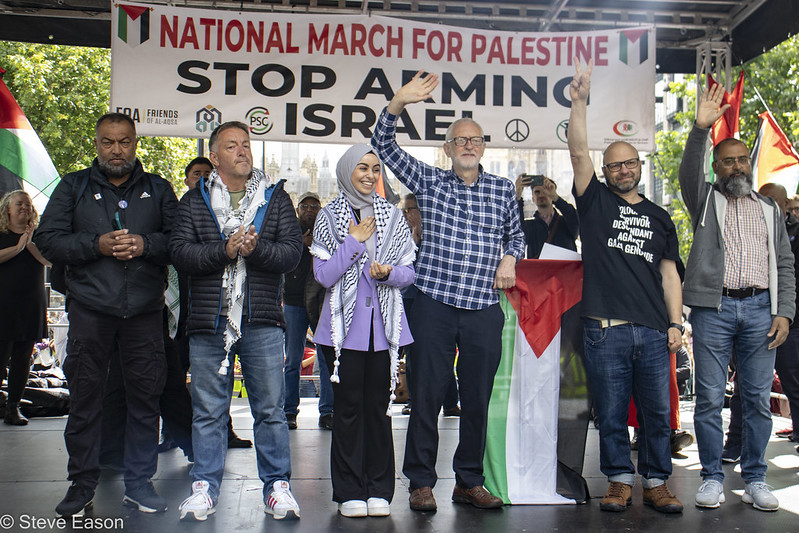
Below, Leanne Mohamed. Images by Steve Eason.
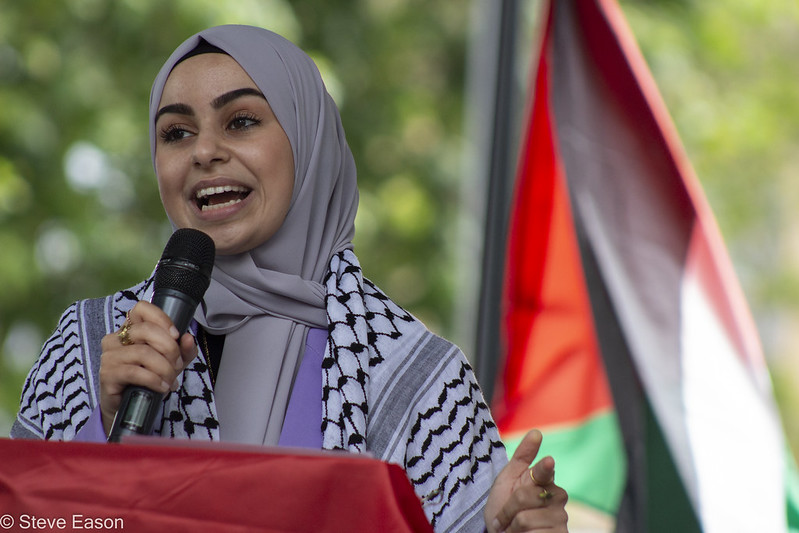
But whilst Gaza was the decisive factor in the defeats of Ashworth and company, it wasn’t the only issue driving Muslim voters away from Labour. In the run up to the election, Labour leader Keir Starmer and MP Jonathan Ashworth made deeply disparaging comments about people from Bangladesh.
“If you speak to [MP currently suspended from the Labour Party] Apsana Begum, she will tell you how difficult her campaign was as a Labour candidate,” says Ali. “She’s’ obviously on the left of the party and supportive of Gaza, but even she had trouble because a lot of the Bangladeshi voters in her constituency were angry, like ‘why randomly pick on Bangladeshis?’”
He says that outrage over the comments played out in Keir Starmer’s own constituency, where the working-class Bangladeshi community turned out for the pro-Gaza independent Andrew Feinstein. This movement of voters caused Starmer to lose almost 20,000 votes, an embarrassing result for a party leader coming to power on a huge majority.
It was the final straw for a voter base that has long felt deeply disillusioned with the party it has most often been associated with. Ali says that this often expresses itself through a feeling that voters have been “taken for granted” and that they have “always voted Labour because they saw the Tory party as even worse.” Sumayya agrees, saying that politicians, and Labour in particular, “weren’t representing us at all at any level. And we have known this to be a fact for a very long time.”
The Forde Report into racism in the Labour Party, released in 2022, blew a lid on how figures in the party leadership dismissed Islamophobia and were “operating a hierarchy of racism.” One person who submitted evidence to the report was quoted as saying: “It is incredibly hard not to draw the conclusion that, just as in British society, Islamophobia is not treated with the same seriousness within the Labour Party as other forms of racism.”
Following its release, the Muslim Association of Britain said it had exposed “a toxic culture of racism and Islamophobia within Labour Party structures.”
Sumayya puts the issue in the wider context of Islamophobia across society as a whole: “Muslim communities in general in the UK are unfortunately disenfranchised or sidelined.”
“This is our experience, this is what we go through,” she says. “Only the other day in Aldi, I was told to go home. And so, you know, these are day-to-day experiences that we have, that our children face, that we have faced all our lives that are only getting worse.”
Compounding disillusionment with Labour are also the class dynamics within the Muslim community itself, and the position that many British Muslims find themselves in. As a mother of three, Sumayya references her own struggles in affording to get by and give her children a decent standard of living, adding that many Muslims in Britain live in some of the poorest areas of the country. “They struggle with the cost of living, struggle with housing, struggle with access to adequate healthcare… education,” she says.
Ali says that class tensions have developed within Labour at a local level, and there has sometimes been “a struggle” within Muslim communities and a “resentment of local Labour run councils.”
“You had Muslim constituents saying, ‘well we don’t feel represented by these Muslim [Labour] councillors,’ not just on Gaza but on doing the very basic things like potholes, looking at social housing, investing in local communities.” He brings up the Labour run Birmingham council: “You’ve got 16 youth centres at risk of closure and the independent candidates really tapped into that feeling of anger.”
“If you think about where many of these communities are, they are in very deprived working-class communities. We think of the “Red Wall” constituencies and the left behind, [Muslim communities] are also impacted by deindustrialisation, child poverty and austerity.” The situation strengthened the hands of independents who were able to tap into wider disillusionment with Labour’s bleak economic agenda, not just with Muslim voters but more broadly.
This was arguably the case in Birmingham Ladywood, a seat where Labour’s vote plummeted under pressure from the pro-Gaza independent candidate Akhmed Yakoob. The large Muslim population in the seat was part of the picture, but so too was the presence of a multicultural working-class community.
The constituency also holds the ninth highest concentration of Black, African or Caribbean voters in Britain whilst almost a quarter of the population is White. In the run up to the election, voters not only expressed anger over Gaza, but also poverty, lack of investment and unemployment. One resident, Lorna Neale, told the BBC in June: “More food banks are opening, even schools have food banks.” Another said: “A lot of people have been laid off, especially in factories, and I’ve talked to a lot of single mothers who can’t afford to put food on the table and buy the basics for their children.”
In the Ladywood ward, 35 percent of children are growing up in poverty.
As Ali points out, “the two-child limit [which Labour backed] has disproportionately affected Pakistani and Bangladeshi households who tend to have more kids,” but this was also something which hit working class households across the board. When Yakoob campaigned, his poster not only urged people to ‘Lend Gaza your vote,’ but also promised to be a ‘voice for the voiceless.’
“Most of the population is in the same boat,” says Sumayya. “I don’t think much of the UK population believes that the current politicians are actually interested in their everyday struggles.” What she saw in the campaign was that working-class voters from all different backgrounds were motivated by Gaza but then found an outlet for other grievances in independent, Plaid Cymru or Green Party candidates.
“It’s important that when we talk about the Muslim vote, we’re not just talking about Gaza, we’re also talking about a wider sense of disillusionment with politics in general and the state of the economy too,” Ali says.
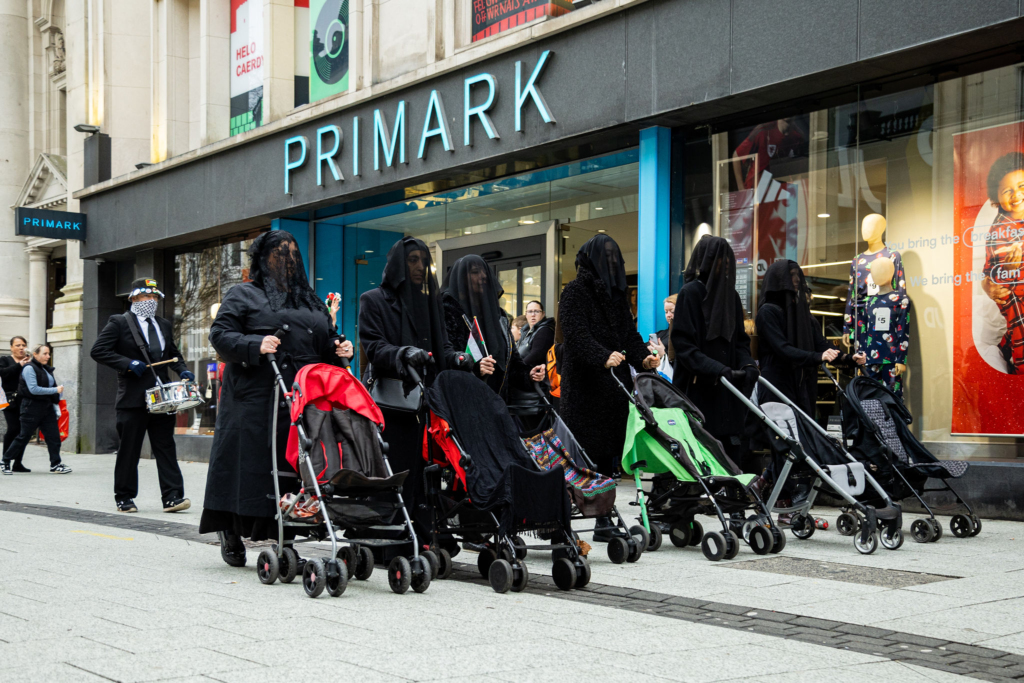
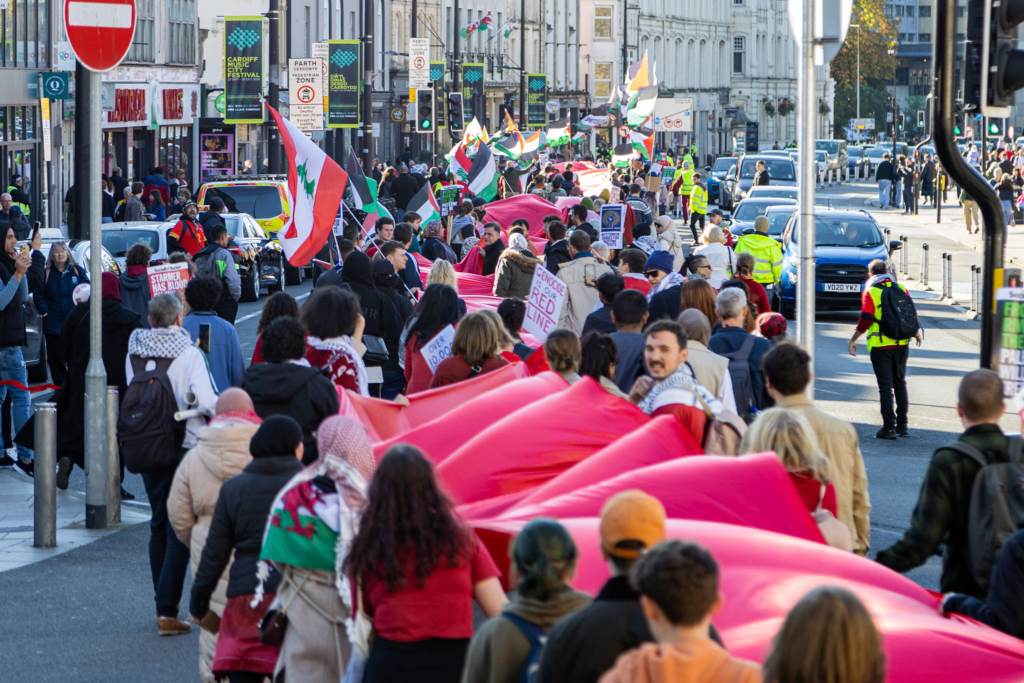
Since the election, disillusionment with the new Labour government has become rife.
There is a deep well of bitterness and anger towards the political establishment in Britain. A valid sense that whichever suited politician gets in, nothing changes. Starmer has joined this revolving door of machine politicians seamlessly, never once stepping out of line.
The decision taken to remove the winter fuel allowance, taking the payment off 9.2 million older people in Britain, quickly became a lightning rod for anger at the new administration. And after of attacks on public services and the poorest, including the most recent assault on welfare recipients, Labour have slumped in the polls. In one recent survey, Starmer’s party was third, behind the Tories in second and, alarmingly, Reform in first.
These are worrying signs for Labour, especially since its victory was more marginal than initial appearances would suggest. At the next election, 60 percent of Labour’s seats – 239 in total – would be lost if there was a swing of less than 10 percent against the party. After the 1997 election, only 30 percent of Labour constituencies were this vulnerable.
Many (though by no means all) of Labour’s traditional safe seats are in areas with high levels of poverty and social deprivation. But these places are becoming markedly less dependable. In five of the six most deprived constituencies in England and Wales, Keir Starmer oversaw a huge drop in support compared to 2019.
This played out in less multicultural areas as well. In Knowsley, ranked the fifth most deprived constituency in England and where over 95 percent of the population identify as being White, the party’s vote dropped by twelve percent. Across the twelve seats that make up Labour’s traditional heartland in the South Wales Valleys, the party’s vote fell by an average of 5 percent compared with 2019. Taken together, the picture is one of voters that were once considered part of Labour’s base leaving the party, possibly for good.
“When we look at the polls now, there’s been a massive decline in both support for the party and for Keir Starmer,” says Taj Ali. “What this means is that those loyal core Labour voters are more crucial than ever in those close parliamentary constituencies. If we were to see another moment of mobilisation in these communities where independent candidates challenge the Labour Party, I think they could be in real trouble here.”
Sumayya agrees that the insurgent nature of the independent candidates’ campaigns showed what can be done; that Labour can be defeated from the left.
“There were areas with, you know, large Muslim populations, and large populations of supporters of the Muslim Vote campaign who were not Muslim, where we managed to secure this change and it gave hope,” she says. “It gave a very strong message to Labour that you have really messed up and you have lost your grounding in these supposedly safe seats.”
The big question now facing those to the left of Labour is whether they can build on the experience of the election to mount a more sustainable electoral challenge in the future. Combining anti-imperialist politics with a radical line on the economy can clearly mobilise voters from all backgrounds, but building an organisation that can do this is far from simple. The Respect party, which was formed out of the huge anti Iraq war movement in the early 2000s, deposed big name Labour MPs before its eventual demise. Corbyn’s most successful period came when he wasn’t afraid to take on British foreign policy and big business at the same time, but his project was hemmed in and ultimately destroyed by the Labour party itself.
After the setbacks of recent years, there is a sense that a new beginning is needed. Various moves have been made to fill the gap and the pro-Gaza independent MPs and Corbyn have agreed to work together in parliament.
But the issue has become more pressing given the rise of the far right and its successful attempts to tap into anti-establishment sentiment and rising political anger. These are not disparate threats from gaff-prone racists seeking local office, but from figures now sitting at the top of some of the world’s most powerful economies – and who are being backed by the richest man on the planet.
In many of the constituencies that are now marginal for Labour, the party in second is Reform. In others, it is those to the left of Labour who pose the biggest challenge. The Muslim Vote campaign was both highly effective and put together with real urgency, delivering hundreds of activists on the ground and causing major upsets. Sumayya believes that it can play an important role in future elections, including the Senedd Elections in 2026.
“There are many places in Wales where Reform got second place in the elections, and those are worrying figures,” she says. “That is something that we’re looking at, of course it is. It signals a very dangerous shift to the very far right. And it’s not just dangerous for Muslims.”
What the election has shown, refracted in particular through the rupture of Labour’s Muslim voter base, is that there is no inevitability in politics. The lack of enthusiasm for the status quo has created a volatile dynamic where new political actors can overturn established parties.
If the first-past-the-post system has so far halted this process from unfolding in Britain in the way it’s happened across Europe, then it feels like the dam is finally starting to crack. “Labour is in deep trouble, and so are the Tories,” Sumayya says in conclusion.
“Now, in areas where the Muslim Community isn’t as numerous and isn’t as strong there needs to be, you know, a very invested effort in speaking to those communities so that a kind of radical right shift is not easy to achieve.”
“We need to be on the ground with the different communities of Mid Wales, North Wales, East and South. It’s one thing to speak about engagement with the Muslim Community, but non-Muslim British communities are also not getting the ear of their politicians.”
*This article has been amended.

